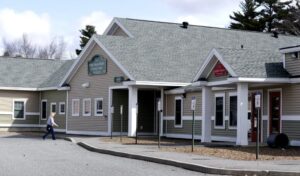How did you first get involved with Preble Street?
I chaired the Greater Portland United Way Campaign in 1997 and toured every agency. The one that impressed me the most was Preble Street.
What do you do when you’re not at Preble Street?
I sit on corporate boards and investment committees; I spend time with friends and family and love to go to the beach!
There are a lot of nonprofit organizations in southern Maine. Why do you think Preble Street stands out in the crowd? What is it that Preble Street does better than anyone else?
Preble Street has a sterling reputation for exemplary leadership – nobody can talk about Preble Street the way that Mark Swann can – combining passion and bringing a business sense to solving these tough social challenges. And throughout the years that I’ve been involved with the agency, I’ve seen time and again that Preble Street is not afraid to address big problems.
What are the biggest challenges Preble Street faces looking to the future? Or what are the specific projects/aspects of Preble Street that you are committed to? The biggest challenges facing Preble Street is the broken mental health system; the stigma faced by unsheltered people; and funding. We once hoped there would be no need for shelters. But, the environment has not been conducive to that.
Being a nonprofit board member can be very demanding and time-consuming. What makes it all worthwhile?
Knowing the work is measured in human lives. As good as Preble Street is at its work, my wish is that Preble Street didn’t have to exist. I wish that people were not seriously ill and unhoused. I wish no one went hungry.
But since that is not the case, Preble Street is there to give people hope and to often save their lives.

Compassion in action: Preble Street at 50
“If you can’t get what you need, we’re here,” was the message Joe Kreisler wanted people experiencing poverty to hear when he founded High Street Resource Center (the organization that evolved into Preble Street) in 1975. For 50 years, Preble Street has been here – expanding far beyond a handful of social work interns in

The first 24/7 Preble Street program in Bangor
A sad reality of emergency shelters is that they are always at risk of closing their doors. Over the past fifteen years, at least nine shelters in Maine have closed due to funding issues. Site-based Housing First is the long-term permanent housing solution for many of the people in Maine experiencing chronic homelessness, but until the

Letter from Swannie: Winter 2024/2025
Photo: Between 1981-1993, Preble Street operated a day shelter in this Chapel providing breakfast, phones, bathrooms, mail, and links to community services. As we approach this milestone anniversary of 50 years, I’ve been reflecting more and more on Preble Street’s history and its future. When I was hired in 1991, I was one of two employees at Preble Street, alongside Florence

